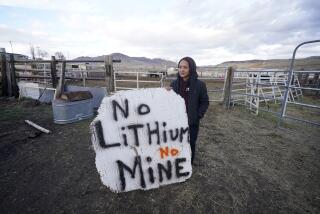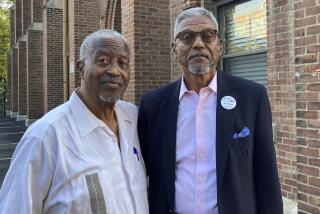600 Navajos at Hearing on Aid for Ill Uranium Miners
- Share via
SHIPROCK, N.M. — More than 600 Navajos jammed a public hearing here Tuesday looking into allegations that the federal government failed to protect the health of uranium miners, many of them Indians, hired during the early days of the nation’s atomic weapons program.
Numerous miners and miners’ widows testified that they had not been warned by employers of any danger, yet have since suffered numerous cancers and respiratory illnesses.
Ray Joe, who worked in the mines from 1949 to 1961, said: “They were in a hurry to make bombs. Thirty minutes after blasting the mine with dynamite to loosen the ore, we would go into the mine, where it was smoky and difficult to breathe. There were no jobs on the reservation, so we would just go in there.”
Sen. Jeff Bingaman (D-N.M.), chairman of the hearing, said: “During the period from 1947 through 1961, the federal government controlled all aspects of the production of nuclear fuel.” Bingaman and other critics contend that the government systematically downplayed the danger to the workers and should now set up a fund to compensate them.
Bingaman called the hearing to compile testimony supporting a bill approved by the Senate Labor and Human Resources Committee. It would establish a $100-million trust fund to compensate uranium miners who worked in the mines from 1947 to 1971. The bill would also compensate residents who lived downwind of fallout from above-ground nuclear tests conducted during the 1950s and ‘60s.
The National Atmosphere Nuclear Testing Compensation Act, introduced by Sen. Orrin G. Hatch (R-Utah), covers an estimated 300 miners in the Four Corners area of the Southwest and about 800 residents of areas down wind of the Nevada atom bomb test site.
The Justice Department contends that the available scientific evidence does not support the conclusion that many cancers have been caused through the government’s atomic testing or its activities with regard to uranium miners.
But Richard W. Hornung, chief of statistical services at the federal Centers for Disease Control in Atlanta, testified that Southwestern uranium miners suffered five times the expected lung cancer rate. About 350 lung cancer deaths have been recorded among the 4,146 miners, he said.
The Navajos from the sprawling nearby reservation emotionally condemned the government.
Pearl Nahkai, a widow, wept repeatedly as she testified that her husband, who died of cancer, mined uranium for 22 years, starting in 1949.
“We lived in a one-room house at the camp located 200 to 500 feet from the mine shaft and tailings. Our children played in the uranium tailings and therefore were exposed to radiation. Our husbands ate lunch in the mines and drank the water that was underground. The majority of the men worked over 20 years or more in uranium mining. At the present, most of them have died of cancer.”
More to Read
Sign up for Essential California
The most important California stories and recommendations in your inbox every morning.
You may occasionally receive promotional content from the Los Angeles Times.













